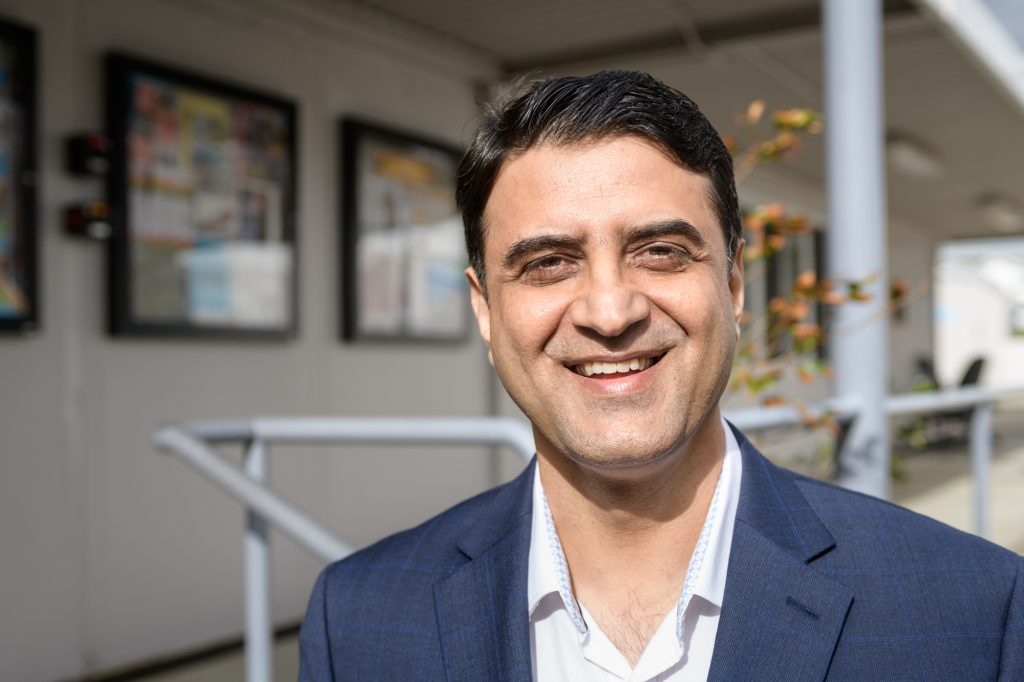English Language Learner (ELL) Healthcare Pathways help professionals from other countries continue their professions, as well as people seeking new careers

With the healthcare worker shortage growing ever more dire, the Mid-Alameda County Consortium (MACC) is looking to provide more accessible pathways to new English speakers to enter the field.
A key figure in this effort is Outreach Specialist Ahmad Farid Raaid, who does outreach to community-based organizations and potential students. Originally an MD from Afghanistan, Raaid’s career was largely focused on public health policy. In 2017, Raaid earned his Master’s in Public Health at University of Massachusetts Lowell through a Fulbright Scholarship. He and his family came back to the U.S. after the change in power in Afghanistan.
“I know the people who are immigrants or newcomers to the United States, they appreciate these opportunities,” Raaid says. “The main problem when they first come to the United States is they are struggling with financial hardships, language barriers, they have limited access to resources.”
“Some of the folks that we’re serving are people that already have extensive backgrounds in healthcare in their home country.”
Beth Cutter, Director, Castro Valley Adult and Career Education
Having gone through these hardships himself, Raaid says he draws from his own experience to build trust with the students he works with. This often comes in the form of helping students find the right program and informing them of the requirements and expectations.
“You can imagine how lucky we were when he came to interview with us and how impressed we were with his background,” Beth Cutter, the director of MACC member Castro Valley Adult and Career Education—where Raaid is based—says. “Not only does he have this extensive background and knowledge of health care, he also has the experience of immigrating to the United States.”
Raaid’s work is part of a larger effort by the consortium to further improve the effectiveness of their English Language Learner (ELL) Healthcare Pathways. His hiring is a result of the English Language Learner Healthcare Pathways funding through the state of California, which has allowed adult education providers throughout the state to add new healthcare pathway courses and improve existing ones, Cutter says.
“We’ve been able to add a lot of additional supports for the English language learners,” Cutter notes. “In some cases the class is structured so that there’s an English teacher in the class with the CTE teacher the whole time.”
The funding is aimed specifically at supporting English language development and career training to expand the healthcare workforce. It is an important tool in providing healthcare pathways to new English Learners, as it not only allows people new to the field to be trained, but also opened the door for those who already had experience.
“Some of the folks that we’re serving are people that already have extensive backgrounds in healthcare in their home country,” Cutter said. “They’ve immigrated to our country, and initially are working in jobs that you know are not a match to their skill set and their passions.”
The grant specifically covers programs offered at several MACC member schools—the Hayward Adult School, Castro Valley Adult and Career Education and Chabot College. Each school offers different healthcare pathways, with some highlights including introduction to healthcare careers, medical office specialist and emergency medical technician at Chabot College.
“Each school has had the flexibility to make it work within their structure and system,” Cutter says. “At Chabot, what they’re doing is a model that is a little bit different, that involves more integrated peer tutoring and a summer bridge program for students entering their classes.”
While the program is still in its early stages, the consortium is looking at how they can further improve and expand it going forward. Raaid says part of this means surveying students after graduation to see who was able to find employment and how.
“That is the area that our job developer is working with students,” Raaid says. “We are hopeful that when the students graduate from our upcoming cohorts, they will be able to easily find the job.”
The Mid-Alameda County Consortium (MACC) is one of 71 consortia of adult education providers across the state. The MACC includes Chabot College, Las Positas College, Eden ROP, Tri Valley ROP, and the adult schools in Castro Valley, Dublin, Hayward, Livermore, New Haven, Pleasanton, San Leandro, and San Lorenzo. For more information about the MACC and its member schools, go to www.macc4ae.org.
Written by Jacob Peterson
| Regions | Classes & Topics |
|---|---|
| Bay Area California | Careers in Health Care – English as a Second Language |